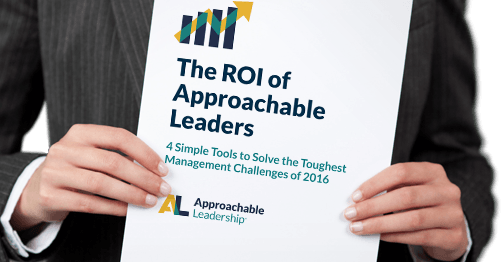Approachable Leadership Research
We are often asked about the studies and books cited in the Approachable Leadership™ keynote speech and the workshop. Here are some links to download some of the key studies and books that we cite (note: some are behind a paywall):
Approachability Research Study (May 2021)
My former intern, Josh Royes Ph.D. and I wrote a research paper on the business outcomes (turnover, organizational citizenship behavior, and organizational satisfaction) seen in organizations with approachable leaders. The study examined whether leader approachability impacts these organizational outcomes above and beyond factors like pay satisfaction and work conditions satisfaction. There were 7,728 participants spread across 48 locations in 3 companies. Short answer: leader approachability has a big positive impact on these critical workplace measures.
Leader Approachability: Reduced Turnover and Other Business Outcomes (Approachable Leadership 2021)
Approachability Dissertation
My former intern, Cameron Brown, wrote his Ph.D. dissertation on leader Approachability. In it he asks (and answers) key questions like: Is leader approachability distinct from other common measures of leadership? Can leader approachability be measured? And does leader approachability have a positive relationship to things like turnover intention or organizational citizenship? (Spoiler alert: the answers are yes, yes, and yes):
Leader Approachability: What Is It, What Is It Good For, And Who Needs It? (University of Tulsa 2016)
Motivation at work
What motivates people to do their best at work (including engaging in organizational citizenship or discretionary effort?). Herzberg’s two-factor motivation theory is still the best explanation.
One More Time How Do You Motivate Employees? by Frederick Herzberg, Harvard Business Review, January 2003
Drive by Dan Pink (2011)
Organizational Citizenship and Approachability
Organizational citizenship is absolutely critical to performance (not to mention engagement). In this study over 67% of observed differences in performance were explained by this one factor:
What Matters More? Contrasting the Effects of Job Satisfaction and Service Climate on Hotel Food and Beverage Managers’ Job Performance Sean A. Way, et al, Cornell Hospitality Quarterly, Vol. 51 pp. 379-397 (2010).
What causes organizational citizenship? One example of organizational citizenship is making suggestions. This study that shows that 88% of employees who made suggestions rate their supervisor as approachable:
Does Herzberg’s Motivation Theory Have Staying Power? Nigel Bassett-Jones and Geoffrey C. Lloyd, Journal of Management Development, Vol. 24 No. 10, pp. 929-943 (2005).
More money, live longer and happier, luckier in love
If you aren’t persuaded that being unapproachable will kill you, there are a lot of positive reasons to be more approachable.
You make more money (lots of research cited in the Likeability Factor by Tim Sanders, 2006).
You live longer and happier (check out the research in The Power of Nice: How to Conquer the Business World With Kindness by Linda Kaplan Thaler, Robin Koval, 2006).
You are luckier in love (Eric Barker again, this time explaining how one guy can listen to a couple for 5 minutes and tell whether they’ll stay married with 91% accuracy – care to take a guess how many of the 5 factors he looks for are approachability behaviors?)
How to be more approachable
The first key to being an approachable leader is welcomeness or to create the right space. The assumption here is that people want to be great – nobody wakes up hoping to do a crappy job. The assumptions we make as leaders about those we lead are astonishingly important.
Don’t believe me? Listen to this podcast: How to Become Batman (Invisibilia)
Learn more about the Pygmalion Effect.
Connect Then Lead: How to Get Influence and Use It, Harvard Business Review, July 2013
The second key behavior for approachable leaders is to seek understanding and to create the right feeling. The key behaviors here are active listening and empathy.
How To Be More Compassionate (from one of my favorite blogs, Eric Barker’s Barking Up the Wrong Tree)
Learn more about Active Listening here.
The third key approachability behavior is following through or to create the right action. A big part of this is helping those we lead make progress.
What Really Motivates Workers, by Teresa M. Amabile and Steven J. Kramer, Harvard Business Review January 2010.
Also check out their book The Progress Principle (2011)
Approachability can be a matter of life or death
Is this approachability stuff really all that important? Well, in some cases it is a matter of life or death. The examples Phil focuses on are plane crashes and medical mistakes.
Medical mistakes (over 70% of 2,455 critical incidents in one study) are caused by miscommunication – and this is often caused by the unapproachability of leaders in the operating room.
The Checklist Manifesto: How to Get Things Right, Atul Gawande (2011)
The Human Factor: The Critical Importance of Effective Teamwork and Communication in Providing Safe Care, Leonard et al, Quality Safety Healthcare, Vol. 13 (Suppl 1) pp. i85-i90 (2004)
Silence Kills: Seven Crucial Conversations for Healthcare, VitalSmarts, L.C. (2005)
Plane crashes often happen due to miscommunication in the cockpit, again often because leaders are unapproachable to flight crew.
Korean Air Lines story from Outliers: The Story of Success, Malcolm Gladwell (2011)
Air Florida Flight 90 (This is the flight recording we listen to during the keynote).
Continue your journey
The research listed above is literally the tip of the iceberg. Once you start looking for approachability behavior you’ll notice it everywhere. Please let me know anytime you see research or a story or anything that you think is a good example of approachability at work or in life. Good luck!

